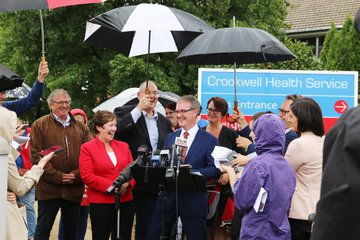NSW Labor Leader, Michael Daley, announced a three-point plan for small country hospitals and multi-purpose services (MPSs) to improve health services in the State’s smallest rural communities, as part of Labor’s schools and hospitals before stadium plan.
Currently, there are more than 48 small community hospitals and 57 MPSs in NSW.
Many provide long-term aged care as well as acute health services. The MPSs often cater for communities with a population between 1,000 and 4,000.
The plan comprises:
- Investing $250 million in small country hospitals and multi-purpose services (MPSs) – including an extra $50 million for capital works and infrastructure – in the State’s smallest rural and remote hospitals.
- Beginning the formal process to consolidate a new minimum nurse staffing standard – of three nurses on every shift instead of two, at small country hospitals and MPSs – as the next instalment of its nurse to patient ratios plan; and
- A formal review into the direction, effectiveness and provision of health services by MPSs – in the next term of government – to set the future direction of rural health care.
The first hospitals to have the new minimum nurse staffing level guaranteed will include Crookwell, Pambula, Yass, Tenterfield, Kyogle, Denman, Scott Memorial (Scone), Wilson Memorial (Murrurundi), Gilgandra, Dungog, Delegate, Warren, Blayney, Tomaree, Narrandera, Manilla, Bombala and Coonamble hospitals.
Mr Daley also reaffirmed Labor’s February commitments to deliver an extra $4.7 million for a maternity ward at Yass District Hospital and $3.5 million for emergency department improvements and an additional ED bed at Crookwell District Hospital.
The $250 million rural health facilities fund will be used for:
- Upgrades and improvements to existing hospitals, MPSs including provision of cancer care and kidney dialysis;
- Planning for new or expanded regional MPSs and hospitals; and
- Delivering additional equipment and medical technology for rural hospitals including improved tele-medicine.
“This is about providing the best quality care to patients in rural and regional areas.
“Unfortunately, under the Nationals, there is now a two-tier health and hospital system.
“This is also about providing safe staffing levels for our smallest health facilities; improving patient care, re-assuring family members and supporting hard working nurses and other hospital staff.
“We know that there is more to do in small country hospitals and MPSs.
“Sadly, when nurses are overworked mistakes can be made. That is why NSW Labor will review minimum nurse staffing in these hospitals to start to fix the inaction of the National Party,” Mr Daley said.
The terms of the formal process for nursing in small country hospitals and MPSs would be agreed and it would be conducted by the Ministry of Health and the NSW Nurses and Midwives Association.
Previously, during the election campaign, NSW Labor announced a new nurse to patient ratio system would apply to emergency; maternity; medical and surgical; paediatric wards; and mental health units to bring NSW standards up to those already in law in Victoria and Queensland.
“This policy is about improving patient care in our State’s smaller hospitals.”
“The Berejiklian Government have the wrong priorities – they would prefer to spend billions on Sydney stadiums rather than ensure our patients in our smallest hospitals receive the best quality care.”




